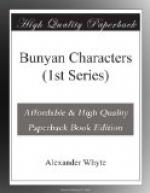Let us, then, this very night begin to do something practical after all this talk about talk. And let us all begin to do something in the direct line of our present talk. What a noble congregation of evangelical Carthusians that would make us if we all put a bridle on our tongue to-night before we left this house. For we all have neighbours, friends, enemies, against whom we every day sin with our unbridled tongue. We all have acquaintances we are ashamed to meet, we have been so unkind and so unjust to them with our tongue. We hang down our head when they shake our hand. Yes, we know the men quite well of whom Pascal speaks. We know many men who would never speak to us again if they only knew how, and how often, we have spoken about them behind their back. Well, let us sin against them, and against ourselves, and against our Master’s command and example no more. Let this night and this lecture on Talkative and his kindred see the last of our sin against our ill-used neighbour. Let us promise God and our own consciences to-night, that we shall all this week put on a bridle about that man, and about that subject, and in that place, and in that company. Let us say, God helping me, I shall for all this week not speak about that man at all, anything either good or bad, nor on that subject, nor will I let the conversation turn into that channel at all if I can help it. And God will surely help us, till, after weeks and years of such prayer and such practice, we shall by slow degrees, and after many defeats, be able to say with the Psalmist, ’I will take heed to my ways, that I sin not with my tongue. I will keep my mouth with a bridle. I will be dumb with silence. I will hold my peace even from good.’
JUDGE HATE-GOOD
’Hear, O heads of Jacob, and
ye princes of the house of Israel . . .
who hate the good and love the evil.’—Micah.
The portrait of Judge Hate-good in The Pilgrim’s Progress is but a poor replica, as our artists say, of the portrait of Judge Jeffreys in our English history books. I am sure you have often read, with astonishment at Bunyan’s literary power, his wonderful account of the trial of Faithful, when, as Bunyan says, he was brought forth to his trial in order to his condemnation. We have the whole ecclesiastical jurisprudence of Charles and James Stuart put before us in that single satirical sentence. But, powerful as Bunyan’s whole picture of Judge Hate-good’s court is, it is a tame and a poor picture compared with what all the historians tell us of the injustice and cruelty of the court of Judge Jeffreys. Macaulay’s portrait of the Lord Chief Justice of England for ferocity and fiendishness beats out of sight Bunyan’s picture of that judge who keeps Satan’s own seal in Bunyan’s Book. Jeffreys was bred for his future work at the bar of the Old Bailey, a bar already proverbial for the licence of its tongue and for the coarseness




